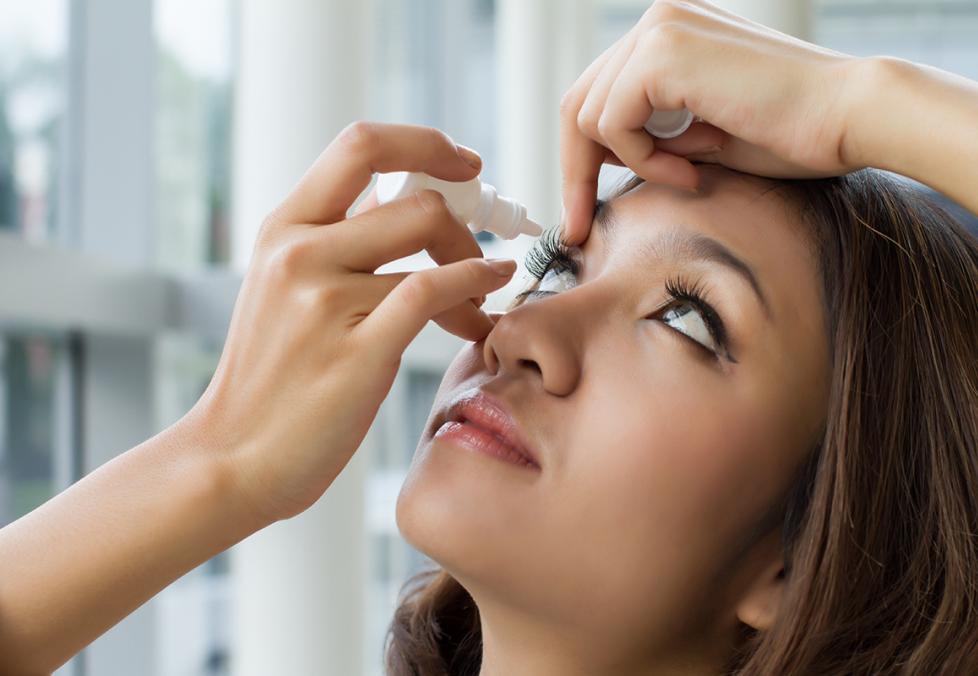
If scratchy, burning eyes have you ready to toss your lenses, hold tight. Here’s what an America’s Best optometrist recommends for more comfortable vision.

Medically reviewed by Sonal Soni, O.D.
Healthy, well-moisturized eyes are something we probably don’t notice or appreciate when we have them. But if you wear contact lenses, your eyes may dry out more easily than those of people who don’t, causing discomfort or blurry vision.
Dry eyes are a common complaint among people who wear contacts. According to a study in Clinical Optometry, as many as 40% of soft contact lens wearers have dry eyes, and 25% of those describe their symptoms as moderate to severe.
“Contact lenses are essentially a shield on your eye,” says Sonal Soni, O.D., an optometrist at America’s Best Contacts & Eyeglasses in Orlando, Florida. When you wear contacts, it cuts off some of the oxygen supply to your cornea, the clear outer layer on the front of the eyeball. Even “breathable” contact lenses can cause issues.
Dr. Soni also says that people who wear contact lenses may not blink as much, and that can lead to more dryness and discomfort. According to the American Optometric Association, every time we blink, our eyelids wet our eyes with tears. Blinking also washes away any debris that may be causing irritation.
But none of this means you need to stop wearing contacts forever. Here’s what you can do to help keep your eyes hydrated and your vision clear.
Did you know that contact lens prescriptions need to be renewed every year? Find an exam time that fits your schedule!
First, Check in With Your Eye Doctor
When your eyes are dry, you’ll know it. According to the National Eye Institute, these are the signs to look out for:
- A scratchy feeling, like there’s something in your eye
- Blurry vision
- Light sensitivity
- Red eyes
- Stinging or burning feelings in your eye
That said, any time you’re experiencing new and/or bothersome dry eye symptoms or vision changes, it’s worth checking in with your eye doctor, says Dr. Soni. An eye exam can pinpoint the root of the problem, which means the route to relief will be faster.
Fortunately for contact lens wearers with dry eyes, there are many remedies that can help bring relief and keep your vision clear.
1. Try Over-the-Counter Eye Drops
The most common treatment for mild dry eye is a product called artificial tears. (Not to be confused with redness-relieving drops, which are not a good choice for dry eye.) You can buy these eye drops over the counter (OTC) without a prescription. Drugstores also sell OTC moisturizing gels and ointments that may help ease your discomfort.
Ask your eye doctor which product is best for you, and if there are any special dosing recommendations. And always remember to follow the instructions on the product label.
2. Deep Clean Your Contacts
Even if you’re satisfied with your contact lens solution, it never hurts to give your contacts a more thorough cleaning.
“If you wear two-week or monthly contacts, consider using Clear Care, a hydrogen peroxide solution,” says Dr. Soni. “It helps remove the debris and clean the contact lens surface to allow more oxygen and moisture to the lenses.”

3. Take a Contact Lens Break
To keep your eyes moist and blinking more often, resist the urge to wear your lenses from morning to night.
“If the dryness is unbearable, it’s important to make a decision to take those breaks,” says Dr. Soni. “Follow the rule of wearing them during the typical workday hours of 9 to 5.”
And while some lenses are designed to be worn overnight, experts say it’s not a wise idea. According to the Sleep Foundation, sleeping in contact lenses makes your risk of developing an eye infection six to eight times higher.
4. Switch Up Your Contact Lens Type
If the lenses you wear are irritating your eyes, let your optometrist know. They may be able to prescribe you a different brand or type of contact lens that causes less irritation. For example, daily-wear lenses have less time to accumulate buildup that can dry out and irritate your eyeballs, compared with monthly contact lenses.
5. Make Some Lifestyle Tweaks
It might not just be your contact lenses that are causing dry eye trouble, Dr. Soni adds. Your eyes might feel better if you try some of these tips too:
- Avoid smoke, wind, and air-conditioning whenever possible.
- Drink enough water throughout the day.
- Limit screen time and take frequent breaks.
- Sleep seven to nine hours a night.
- Use a humidifier to make the air in your home less dry.
- Wear wraparound sunglasses. This frame style offers more protection from wind, sun, and other irritants.
6. Ask About Prescription Medicines
If the above tips don’t offer enough relief, or if your dry eye is chronic and more serious, you may need a more powerful remedy, says Dr. Soni. The National Eye Institute says prescription eye drops called cyclosporine (Restasis) and lifitegrast (Xiidra) can help your eyes produce more tears.
Medically reviewed by Sonal Soni, O.D.
See our sources:
Link between contact lenses and dry eye: Clinical Optometry
Dry eye overview: American Optometric Association
Facts about dry eye: National Eye Institute
Why you shouldn’t sleep with contact lenses: Sleep Foundation

